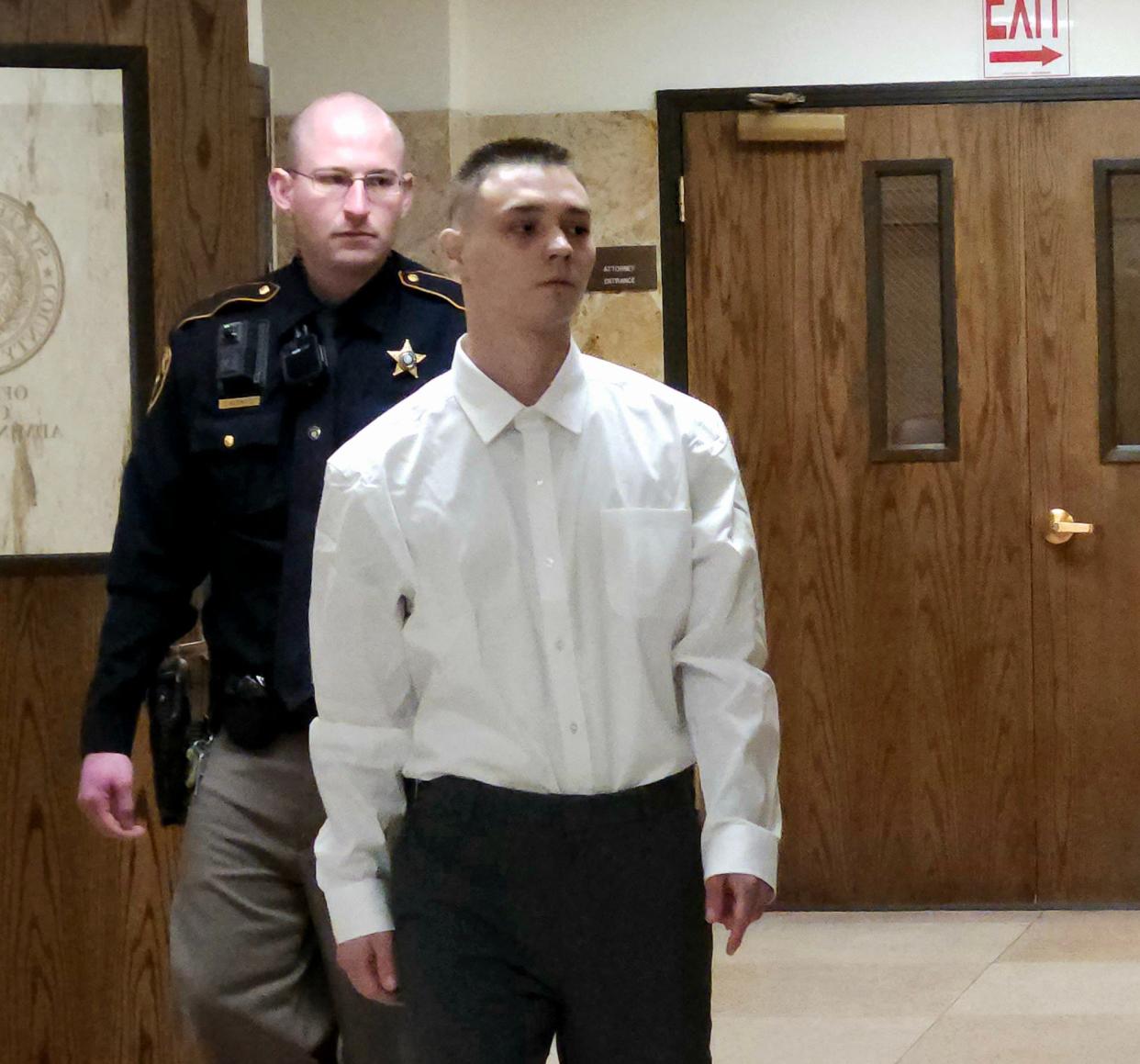Kaleb Vasquez sentenced to life in prison for deadly 2020 Lubbock Walmart shooting

A Lubbock jury handed Thursday a life prison sentence to a 23-year-old Kansas man whose attorneys argued was in the grips of a methamphetamine-induced psychotic episode nearly four years ago when he shot and killed a 42-year-old man shopping at a northwest Lubbock Walmart.
Kaleb Anthony Vasquez stood with his attorneys, Matt Morrow, Ryan Phelan and Bill Wischkeamper, as 137th District Court Judge John McClendon read aloud the verdict.
A jury of 9 woman and three men arrived at the verdict after deliberating about four hours on a punishment range of five years to life in prison. He will have to serve 30 years of his sentence before he becomes eligible for parole.
Vasquez, who has been held at the Lubbock County Detention Center since Dec. 5, 2020, pleaded guilty on Monday to a count of murder in the Dec. 4, 2020 shooting death of 42-year-old Roel Munoz at the Walmart in the 700 block of West Loop 289.
A random shooting in a Lubbock Walmart
Investigators with the Lubbock County Metropolitan Special Crimes Unit quickly identified Vasquez as the shooter after speaking with his family and obtaining footage from the store's security cameras.
Prosecutors played the video to jurors during the four-day trial, that showed Munoz making his way to different parts of the store as he shopped for his wife, who was waiting in the parking lot.
Meanwhile, Vasquez, arrived at the store with his sister and mother.
While, Vasquez and Munoz could be seen passing each other at times, the two never interacted until the shooting.
Vasquez could be seen walking past Munoz before spinning around, pointing his stepfather's handgun at Munoz and firing once. Munoz died instantly.
Vasquez could be seen running away. He first tried to leave through an emergency door, which triggered an alarm but didn't immediately open. Instead, Vasquez leave the store by running to the garden center, scaling a fence and heading east across West Loop 289, stopping briefly to throw the murder weapon in a drainage hole.
Vasquez was ultimately arrested about 7 p.m., less than four hours after the shooting, at a gas station near the intersection of 19th Street and Avenue A where Jose Alvarez was refueling his vehicle and told jurors Vasquez attacked him to steal it.
Alvarez fought back and pulled off Vasquez's jacket when he tried to run away.
Prosecutor Chris Schulte told jurors in his closing argument that Vasquez deserved a life sentence because of the violent, unusual, extreme, nature of the crime.
"This was a random killing," he told jurors. "Kaleb Vasquez decided, on his own accord, to execute Roel Munoz on aisle I28 of Walmart."
Meth, the Devil and a 'drug-induced psychosis'
Defense attorneys waived a closing argument. However, they called on William Gerber, the director of the Center for Collegiate Recovery Communities College of Human Sciences at Texas Tech, who told jurors he met Vasquez a week before the trial for an evaluation and believed he was suffering from a drug-induced psychosis that manifested in auditory hallucinations. He believed the Devil was telling him to kill Munoz.
"The Devil was telling him if he did not kill the individual the individual was going to kill him and his family," Gerber said.
He said Vasquez told him that he had used a gram of methamphetamine a day before the shooting and was sleep deprived, which was consistent with people experiencing psychosis induced by drugs.
"He appears to be having a break from reality," he said. "He believed what he believed, which was he was in danger and his family was in danger."
Gerber told jurors that Vasquez said he began using marijuana and alcohol when he was 14. At 16, he used psychedelic drugs including LSD and mushrooms.
At 18, he began using methamphetamine and within a year of using it was experiencing auditory hallucinations. A year later, he began seeing "shadow people," Gerber said.
Vasquez, who had been living in Kansas, moved to Lubbock to get clean, Gerber said.
Amber Hemphill, who screened Vasquez after he was booked into the jail, told jurors her assessment indicated Vasquez was a suicide risk.
Hemphill who was called on by defense attorneys, told jurors that Vasquez appeared uneasy, agitated and fidgety, saying he constantly looked over his shoulder and had difficulty speaking clearly.
"I was pretty concerned about his behavior at the current time," she said.
Within 20 minutes of the screening, Vasquez was placed on suicide watch, she said.
However, prosecutors played footage from a Lubbock police officer's body-worn camera as Vasquez was being photographed at the Metro headquarters shortly after his arrest. Vasquez appeared calm and compliant as the officer took his photos.
There was no evidence that Vasquez was tested for drugs after his arrest.
Jurors were instructed before deliberating that voluntary intoxication wasn't an affirmative defense for a crime, however, they could consider it as mitigation.
Vasquez's defense attorneys waived their closing arguments.
Schulte told jurors that Vasquez's actions shouldn't be blamed on drugs, which he said was an unquestionably big problem in the community as his office prosecutes thousands of people with addiction issues.
"If every single one of those people randomly decided to kill someone we'd have a murder a day," he said. "We're here because of his choices, exclusively his choices."
He said all of Vasquez's victims that day had on thing in common: they were all minding their own business and had the misfortune of encountering Vasquez.
He also recalled evidence of Vasquez's behavior in jail, which included write ups for brewing alcohol, hoarding medication and getting tattoos, showed he wasn't taking his sobriety seriously.
"The remaining question in this case is how long until you feel safe shopping next to Kaleb Vasquez?" he said.
This article originally appeared on Lubbock Avalanche-Journal: Vasquez gets life sentence for deadly 2020 Lubbock Walmart shooting

